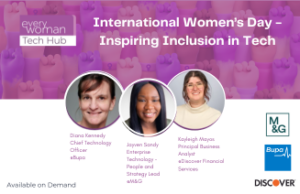
Throughout her career, Senior Vice President at FIS Rajsri Rengan has seen an arc of fast-paced and far-reaching change in the financial sector. The rise of Fintech and its transformative power has changed the way we transact, save and store value over the past 20 years, providing a wealth of opportunities for tech talent. For those thinking of a career in this space, Rajsri’s journey offers insight into the agility and focus needed to stay one step ahead of this ever-evolving industry. She talks to everywoman about why Fintech is such an exciting proposition and what it takes to forge a career at the forefront of a financial revolution.
You have seen many changes in your long career in finance, what has been the biggest?
Fintech is all about technology propelling the financial industry forward, helping companies to provide better services, capture new markets, generate revenue and deliver an exemplary client experience. The biggest shift for me was when the customer of a branch became the customer of a bank and that was the point at which banks started moving from a completely manual environment to a technology-powered one. In a manual environment, you open an account with a branch near your workplace or residence and you have to go there for all your transactions. But when the bank is powered by technology, you can go to any branch and transact anywhere. I would say that is when financial services became financial technology. When this was starting to happen some 20 years ago, I was in the banking industry, and one of my early roles was to implement core banking software and convert all the manual processes into software-driven.
What challenges has been most satisfying for you in your Fintech career?
In my career, I launched ATMs, followed by phone banking, internet banking and then worked on separating the customer service from the back-office processing function. I moved from being a functional banker to being a technical person over an intense period of time — and at that point I thought, ‘Maybe it’s time to sit on the other side of the table?’. Rather than being a banker working with the software vendors, I went to join a software company to start working with the banks, because I know technology and banking and I knew I could add a lot more value to the organisations and to customers doing that. I know what they want, what is meaningful to them and what their pain points are.
What have you learned by being on the curve of an industry revolution?
You should be learning all the time. Stagnant water start stinking after a while; a river is always running and stays fresh. Fintech is like a flowing river; it just keeps moving but if you don’t move with it, you can never get back to the main stream. The last two decades have seen such incredible accelerated advancement in financial technology and how we handle our monetary transactions, versus how our parents would have done so. And it will only continue; in the not-too-distant future our own children will do all the transactions with their mobile phone or smartwatch and probably using face recognition or biometric rather than passwords.
What is coming in the Fintech space that really excites you?
Everything is going to become digital…and it’s going to happen in the next five years or so. Fintech is now powering all the payments and money movement, and the emerging technologies are exciting, whether that’s the metaverse or the blockchain technology that is going to power decentralised internet. Crypto is something that we know as a digital asset but there are a lot more beyond that, and people will move away from investing in buying a house, land or a commodity like gold, for example, to keeping their wealth in something that they cannot see or touch.
What skills will be needed to implement the future financial vision?
You will need skills in handling data, proficiency in artificial intelligence machine learning, and to be an expert in cloud microservices architecture if you want to be part of the Fintech revolution. On the non-technical side, I would bet on those who study human psychology as being an integral part of the technology revolution. AI needs to learn if it is to behave like a human — it needs to have the same logical thinking capacity. So, I would think that people with psychology-related expertise will be in demand to ensure that the AI systems and tools we create can augment humanity positively.
What are the challenges of a Fintech career as a woman?
I still often find I am the only woman in the room in meetings! So, there can be a challenge in making your voice heard as a woman. Men often just keep talking because they want to make a point — and you have to be determined to speak up. Fintech is fast-paced and that also brings challenges. A lot of women start their technical careers and often slow down if they have family obligations because it’s just too much to meet the demands of both. They find it hard to allocate time to learn, or even to be able to say, ‘Give me an opportunity to lead this project’ when they are faced with competing demands, which may account for a better gender balance at lower levels but the increasing lack of women as you move up to leadership. Alongside that, you just cannot afford to take a year’s break in Fintech and then come back and start again where you were; the nature of the space means that the goalposts will have moved considerably.
What is the secret to balancing a Fintech career with other important demands in life?
It is so important to develop your support system. I was blessed with excellent support from my mum and grandma and that ensured the home ran well and the children were taken care of so I could spend time learning or volunteering for tough projects. It’s vital to remember that ‘Superwoman’ only exists in movies. Men do not ever try to become a ‘Superman’. I tell my mentees that they need to understand what they can do and what they cannot, to have a support system and to delegate as much as they can. A Fintech career is a constant race — and when you’re running a race you need stamina and focus. Don’t think you can sleep for four hours a day and be able to compete with the men at work, who are well-rested (at least in India which still has a patriarchal setup). I would also like to emphasise the importance of creating your ‘work’ support network – be it your co-workers, supervisors, women leaders, mentors, or male allies.
What advice would you give to a woman wanting to build a career in Fintech?
We need more younger women to come and work in Fintech, but for those who do it’s extremely important to build your personal brand as it can often be more difficult for you to get a chance to express your views and make your work visible. And be more confident about putting yourself forward. I’ve seen women managers struggle to take credit for the things that they have done, while men managers aren’t shy to tell you the great work by their project team is because of them. Men are not afraid to put themselves in the spotlight. Women seem to be more self-effacing than men and I include myself in that. I sometimes struggle to take credit for my work. If someone says good job and that we have received great feedback from the client, I’ll say it’s because of my great team. I would never say ‘Yes, thanks, I worked hard to get to where we are’.
What excites you most about the future of Fintech and working at FIS?
FIS is not a new organisation — it is 50 plus years old — but it is a company that innovates and is constantly making itself ready for the future. Innovation is embedded in our culture and everyone is empowered to speak up, think and do things differently. We are a pioneer compared to our competitors in terms of transformation, digitisation, and modernisation initiatives, but still there is more to do and we invest a lot into research and development. We are reimagining how our products should be 5-10 years down the line and we are at a real inflection point in that.
Furthermore, FIS values inclusion and diversity as critical to helping us understand the needs of our increasingly diverse clients. Our continued focus to create a more gender balanced workforce in Fintech is not just tied to our people strategy, but to our broader business strategy.
For me, FIS is somewhere you really want to be, in order to be part of the evolution of Fintech.
To learn about job openings with FIS, visit their careers page here.



